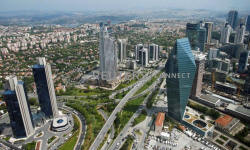Cherry-picking through Turkey's gloom: The funds staying
put while others flee
 Send a link to a friend
Send a link to a friend
 [May 31, 2019]
By Tom Arnold [May 31, 2019]
By Tom Arnold
LONDON (Reuters) - While Turkey's economy
flounders, some foreign funds are buying into everything from fizzy
drinks firms to automakers to banks as they winnow out likely survivors
in the country's beaten down corporate bond and equity markets.
Many overseas investors and macro-focused asset managers are pulling
out, alarmed by a combination of a falling lira, high inflation,
monetary policy missteps and a damaging standoff between President
Tayyip Erdogan's and the United States.
But with Turkey's main equity index down 4% this quarter, others are
cherry-picking based on a different range of criteria, including
companies' exposure to foreign markets, debt levels and relations with
Erdogan.
Germany-based Union Investment, which manages around 343 billion euros
($380 billion) globally, bought into dollar bonds belonging to
Coca-Cola's Turkish bottler Icecek (CCI), and conglomerate Koc Holding.
The sellers were international investment banks.

"We've seen the trade fears and volatility ...and usually it's a very
good opportunity to get some bonds, to do some bottom-fishing," said
Sergey Dergachev, senior portfolio manager at Union Investment, who was
satisfied with the 5 to 6 percent yield offered.
"I'm a long-term investor and long term we are quite positive on Turkey
because you have a young population and huge disparity between the top
corporates issuing bonds with strong corporate governance (and) strong
risk management."
Many investors choosing such names cite their low levels of debt and
healthy cashflow, allowing them to withstand the lira slump and a
recession-plagued economy.
They're also favored because they're large exporters. CCI exports to
several former Soviet and Middle Eastern countries.
"The overall thesis is the economy is weak and will remain weak ...and
the export sector has become more competitive," said Julian Mayo, chief
investment strategist at investment management firm Fiera Capital.
He favors Turkey's only refiner Tupras, carmaker Tofas, a joint venture
of Koc Holding and Italy's Fiat, and household appliance maker Arcelik.
Financial adviser Lazard Asset Management already has overweight
exposure to Turkish equity and is considering adding to its holdings.
"Along with Russia, Turkey is the cheapest market in the world among
significant markets," said James Donald, its managing director for
emerging markets equity.
"...When you discount the risks we think there's still value... If the
currency improved we might add other names with exposure to the domestic
economy."
[to top of second column] |

Bussiness and financial district of Levent, which comprises leading
Turkish companies' headquarters and popular shopping malls, is seen
from the Sapphire Tower in Istanbul, Turkey May 3, 2016. REUTERS/Murad
Sezer/File Photo

'HIGHLY POLITICIZED'
Economic risks include a prolonged recession or sovereign default, while
business relations with Erdogan and the Islamist-rooted AK Party constitute a
political one.
Links between Koc Holding's eponymous family owners - prominent among Turkey's
secular business elite - and the AKP have at times been testy, with some
companies in its portfolio, including Tupras, in the past hit with fines.
"This a highly politicized situation where friends of the government are
spared... and larger banks and larger companies (that) have a history of
opposing Erdogan will probably take the brunt (of economic adjustments)," said
Jan Dehn, head of research at emerging markets investment manager Ashmore Group.
Many banks have been hobbled by a build-up of bad debt linked to the slumping
construction and energy sectors, while Erdogan has harangued the sector for not
cutting borrowing costs.
But some see value.
"We have an acquisition in some of the private sector banks but at a senior
level (that)... looks quite interesting in terms of value," said Filippo
Alloatti, senior credit analyst at Hermes Investment Management.
He declined to specify those banks but highlighted Akbank and Garanti Bank as
favored names, in part due to their conservative approach to risk management.
Their senior dollar bonds offer 7-8% yield, compared to 4.5-5% for the
subordinated bonds of leading Brazilian banks, he noted.

"Turkey is not Brazil. It's in a tough spot but if you don't think they're going
to the wall then its quite interesting as you're well compensated." Alloatti
said.
Dergachev's Union Investment bought Akbank dollar bonds this month. "In terms of
liquidity, even assuming there's no rollover, they (Akbank) have liquidity for
at least mid to end 2020, so they have good liquidity," he said.
(Reporting By Tom Arnold; editing by John Stonestreet)
[© 2019 Thomson Reuters. All rights
reserved.] Copyright 2019 Reuters. All rights reserved. This material may not be published,
broadcast, rewritten or redistributed.
Thompson Reuters is solely responsible for this content. |